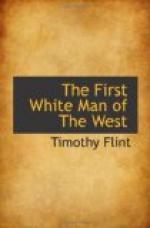Many incidents of moment and interest in the early annals of Kentucky occurred during this reunion of Boone with his family. As his name is forever identified with these annals, we hope it will not be deemed altogether an episode if we introduce here a brief chronicle of those incidents—though not directly associated with the subject of our memoir. In presenting those incidents, we shall be naturally led to speak of some of the other patriarchs of Kentucky—all Boones in their way—all strangely endowed with that peculiar character which fitted them for the time, place, and achievements. We thus discover the foresight of Providence in the arrangement of means to ends. This is no where seen more conspicuously than in the characters of the founders of states and institutions.
During the absence of Colonel Boone, there was a general disposition in Kentucky to retaliate upon the Shawnese some of the injuries and losses which they had so often inflicted upon the infant settlement. Colonel Bowman, with a force of a hundred and sixty men, was selected to command the expedition; and it was destined against Old Chillicothe—the den where the red northern savages had so long concentrated their expeditions against the settlements south of the Ohio.
The force marched in the month of July, 1779, and reached its destination undiscovered by the Indians. A contest commenced with the Indians at early dawn, which lasted until ten in the morning. But, although Colonel Bowman’s force sustained itself with great gallantry, the numbers and concealment of the enemy precluded the chance of a victory. He retreated, with an inconsiderable loss, a distance of thirty miles. The Indians, collecting all their forces, pursued and overtook him. Another engagement of two hours ensued, more to the disadvantage of the Kentuckians than the former. Colonel Harrod proposed to mount a number of horse, and make a charge upon the Indians, who continued the fight with great fury. This apparently desperate measure was followed by the happiest results. The Indian front was broken, and their force thrown into irreparable confusion. Colonel Bowman, having sustained a loss of nine killed and one wounded, afterwards continued an unmolested retreat.
In June of the next year, 1780, six hundred Indians and Canadians, commanded by Colonel Bird, a British officer, attacked Riddle’s and Martin’s stations, at the forks of the Licking, with six pieces of cannon. They conducted this expedition with so much secrecy, that the first intimation of it which the unsuspecting inhabitants had, was being fired upon. Unprepared to resist so formidable a force, provided moreover with cannon, against which their palisade walls would not stand, they were obliged to surrender at discretion. The savages immediately prostrated one man and two women with the tomahawk. All the other prisoners, many of whom were sick, were loaded with baggage and forced to accompany their return march to the Indian towns. Whoever, whether male or female, infant or aged, became unable, from sickness or exhaustion, to proceed, was immediately dispatched with the tomahawk.




